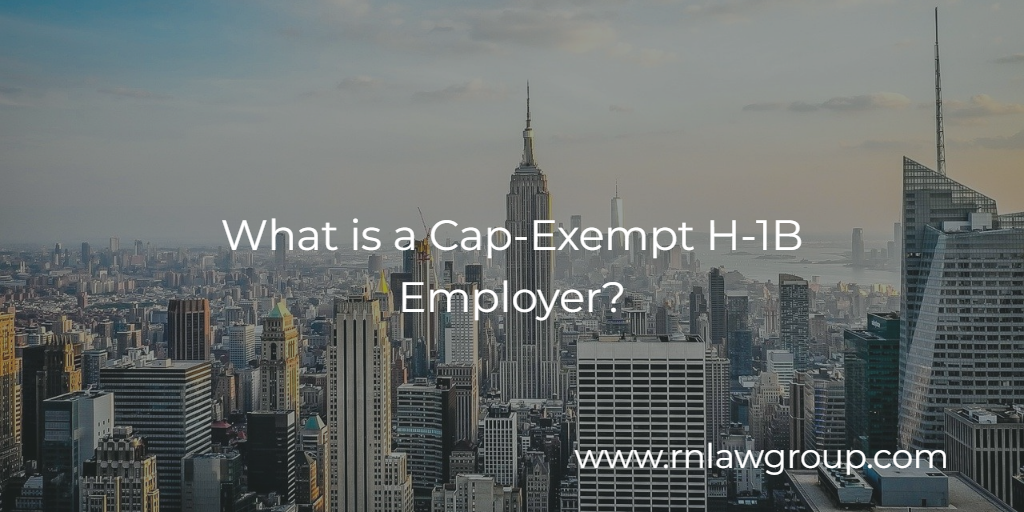
What is a Cap-Exempt H-1B Employer?
It is common for a foreign national to go through the H-1B lottery in order to obtain H-1B status. The lottery is a fairly randomized process that often leaves potential H-1B employees crossing their fingers each year hoping for a selection. However, the H-1B lottery is not the sole route to obtaining H-1B status. Some employers are able to hire foreign nationals through H-1B visas without having to go through the lottery process. These employers are typically referred to as cap-exempt H-1B employers.
What does it mean to be cap-exempt? The term refers to a petition that is exempt from the annual cap on foreign workers with an H-1B visa. Usually, this situation occurs when a Beneficiary who has been on H-1B after receiving an approval through the lottery files a subsequent H-1B petition. Another way for a petition to be cap-exempt is if the sponsoring entity is recognized as a cap-exempt employer. Employers falling under this designation include universities and related nonprofit entities, nonprofit research organizations and government research organization.
Each cap-exempt employer category has its own requirements for eligibility. For example, a university must be a public or non-profit institution, provide admission to students who have earned a secondary education, be licensed by the proper institution, and offer educational programs that award bachelor’s degrees or at least two-year educations toward a degree. In the alternative, a cap-exempt non-profit associated with a government organization or university must be a qualifying non-profit associated with the institution through shared ownership/board control or act as a branch of the subsidiary. Examples of non-profits that would likely fail to qualify include service, policy, and art organizations. Examples of non-profits that would qualify would include universities with affiliations with medical labs, hospitals, and research units.
Due to the fairly narrow scope of the definition of cap-exempt employers not all non-profit organizations qualify. This is why it is strongly recommended that a foreign national seeking employment with an allegedly cap-exempt employer ensure said employer is working with an immigration law firm capable of properly filing the I-129 petition. In addition to confirming the employer’s eligibility, one should also be cognizant that employment with a cap-exempt employer is not an avenue to subvert the H-1B lottery in the event one desires to later obtain employment with a cap-subject employer.
For example, let us explore the following hypothetical: Dave has recently completed his bachelor’s degree in chemical engineering while on an F1 student visa. He has been approached by a non-profit research lab that is affiliated with a major university who is willing to sponsor his H-1B visa. A year after the H-1B is approved and Dave has been working with the company, he is approached by an Oilfield Chemical Company to join the company as a Chemical Engineer. The company files a transfer of Dave’s H-1B marking Dave as cap-exempt in the I-129 forms since he has a prior H-1B with another employer.
In the above scenario, Dave’s H-1B with Oilfield Chemical Company will likely receive either a request for evidence of notice of intent to deny questioning how Dave’s new petition is cap-exempt. This is because Oilfield Chemical Company is not a cap-exempt employer. As such, Oilfield Chemical Company can only seek to sponsor Dave on an H-1B if they are willing to sponsor him in the H-1B lottery and his application is selected, filed for, and approved by USCIS.
While cap exempt employer offer the opportunity to avoid the H-1B lottery they do not allow for the same level of employment opportunity as those who have obtained approvals from cap-subject employers through the lottery. This fact can require a foreign national to undertake additional care when plotting their immigration future to move to H-1B or from a cap-exempt employer to another H-1B petitioner. Thus, any movement to or from one of these employer should be done only after speaking with an experienced immigration attorney.
By: Justin Rivera

